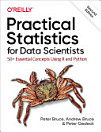Hypothesis Generation and Interpretation: Design Principles and Patterns for Big Data Applications
thg 1 2024 · Studies in Big Data Sách 139 · Springer Nature
5,0star
1 bài đánh giáreport
Sách điện tử
372
Trang
reportĐiểm xếp hạng và bài đánh giá chưa được xác minh Tìm hiểu thêm
Giới thiệu về sách điện tử này
This book focuses in detail on data science and data analysis and emphasizes the importance of data engineering and data management in the design of big data applications. The author uses patterns discovered in a collection of big data applications to provide design principles for hypothesis generation, integrating big data processing and management, machine learning and data mining techniques. The book proposes and explains innovative principles for interpreting hypotheses by integrating micro-explanations (those based on the explanation of analytical models and individual decisions within them) with macro-explanations (those based on applied processes and model generation). Practical case studies are used to demonstrate how hypothesis-generation and -interpretation technologies work. These are based on “social infrastructure” applications like in-bound tourism, disaster management, lunar and planetary exploration, and treatment of infectious diseases.
The novel methods and technologies proposed in Hypothesis Generation and Interpretation are supported by the incorporation of historical perspectives on science and an emphasis on the origin and development of the ideas behind their design principles and patterns.
Academic investigators and practitioners working on the further development and application of hypothesis generation and interpretation in big data computing, with backgrounds in data science and engineering, or the study of problem solving and scientific methods or who employ those ideas in fields like machine learning will find this book of considerable interest.Xếp hạng và đánh giá
5,0
1 bài đánh giá
Giới thiệu tác giả
Hiroshi Ishikawa received the B.S. and Ph.D degrees in Information Science from the University of Tokyo. After working for Fujitsu Laboratories and being a full professor of Shizuoka University, he was a full professor of Tokyo Metropolitan University (TMU) until March, 2021. He is now a distinguished leading professor and an emeritus professor of TMU. He is also the director of TMU Social Big Data Research Center. His research interests include databases, data mining, social media, and big data.
He has published actively in international, refereed journals and conferences, such as ACM Transactions on Database Systems, IEEE Transactions on Knowledge and Data Engineering, The VLDB Journal, IEEE International Conference on Data Engineering, and ACM SIGSPATIAL and Management of Emergent Digital EcoSystems (MEDES). He has authored and co-authored a dozen books, including Social Big Data Mining (CRC, 2015) and Object-Oriented Database System (Springer-Verlag, 1993).
He received the Sakai Memorial Distinguished Award from the Information Processing Society of Japan (IPSJ) in 1994, Commendation by the Director General of Science and Technology Agency of Japan in 1997, Commendation for Science and Technology by the Minister of Education, Culture, Sports, Science and Technology of Japan in 2021, and Commendation from the Database Society of Japan in 2022. He was twice an invited professor at the Polytechnic School of the University of Nantes, France. He was a trustee board member of the Database Society of Japan, an editorial board member of The VLDB Journal, the chairman of the SIG on Database Systems of IPSJ, and an editor-in-chief of IPSJ Trans. on Databases. He is a co-founder of ACM MEDES conference. He is a Fellow of the IPSJ and the Institute of Electronics, Information and Communication Engineers (IEICE) and a member of both the ACM and the IEEE.Xếp hạng sách điện tử này
Cho chúng tôi biết suy nghĩ của bạn.
Đọc thông tin
Điện thoại thông minh và máy tính bảng
Cài đặt ứng dụng Google Play Sách cho Android và iPad/iPhone. Ứng dụng sẽ tự động đồng bộ hóa với tài khoản của bạn và cho phép bạn đọc trực tuyến hoặc ngoại tuyến dù cho bạn ở đâu.
Máy tính xách tay và máy tính
Bạn có thể nghe các sách nói đã mua trên Google Play thông qua trình duyệt web trên máy tính.
Thiết bị đọc sách điện tử và các thiết bị khác
Để đọc trên thiết bị e-ink như máy đọc sách điện tử Kobo, bạn sẽ cần tải tệp xuống và chuyển tệp đó sang thiết bị của mình. Hãy làm theo hướng dẫn chi tiết trong Trung tâm trợ giúp để chuyển tệp sang máy đọc sách điện tử được hỗ trợ.







